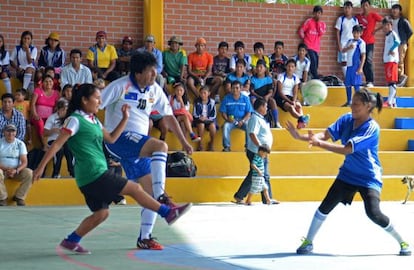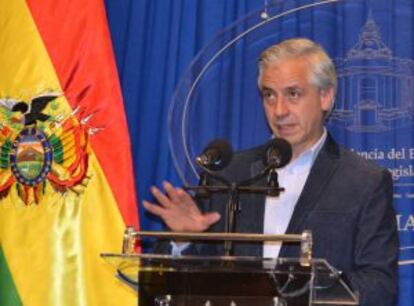Opposition obtains key victories in Bolivian local and regional elections
Evo Morales’ ruling MAS suffers several setbacks but says national policy will not change

The local and regional elections held in Bolivia on Sunday brought good news for opposition parties, five months after they suffered defeat at presidential elections at the hands of President Evo Morales.
On March 29, several opposition parties wrested the cities of El Alto and Cochabamba, as well as the governorships of La Paz and Tarija, away from Morales’ Movimiento al Socialismo (Movement Toward Socialism, or MAS).
A new political era is opening up in this country; people have started getting tired of MAS, of its arbitrariness and its corruption”
Meanwhile, Morales’ political foes managed to hold on to the city of La Paz as well as the mayor’s and governor’s offices in Santa Cruz.
Nevertheless, MAS remains the most-voted force in the Latin American country after securing four governorships and most municipalities across the territory.
The most noteworthy results were achieved by Soledad Chapetón, of Unidad Nacional (National Unity), and by Félix Patzi, of Soberanía y Libertad (Sovereignty and Liberty, or SOL.bo). Both beat the official candidates in their own historical strongholds: the city of El Alto and the department of La Paz.
And in the nation’s capital, former city mayor Luis Revilla, of SOL.bo, attracted 55 percent of the votes, leaving La Paz out of MAS’ reach (43 percent).
Both Chapetón and Patzi are direct descendants of the indigenous Aymara people. Patzi went into politics with MAS and served as education minister under Evo Morales between 2006 and 2007, but was later expelled from the party for insubordination. In this campaign he ran in an alliance with SOL.bo, which brings together several former government allies.
Soledad Chapetón, 34, is an ace up the sleeve of Samuel Doria Medina, the businessman who came in second at the presidential elections of October 2014, when Morales was re-elected to a third term.
“A new political era is opening up in this country; people have started getting tired of MAS, of its arbitrariness and its corruption,” said Doria Medina shortly after an early vote count showed that his candidate had won. “Soledad won despite the threats issued by the government warning people not to vote for her.”
President Morales had stated that the government would not be working with the city of El Alto if it fell into the hands of “the right.”
On election morning, Vice-President Álvaro García Linera recommended not extrapolating the results of the local and regional vote, as similar elections in 2010 showed 1.5 million fewer votes for MAS, yet this has not affect its national predominance over the last five years.

Another major opposition figure, Rubén Costas, sailed to re-election in the most prosperous region in the nation, Santa Cruz, an opposition stronghold since 2006 (although this did not stop Morales from winning the presidential elections here as well).
The fact that MAS did not sweep the board as is customary, coupled with the opposition’s victory in a few key locations, was manifested by the president’s absence from the spotlight at the end of the day on Sunday. Instead, it was his deputy Álvaro García Linera who addressed the media to admit that Bolivians had not supported some of the official candidates.
However, the vice-president attributed this to “a lack of local leaderships” and underscored the positive aspects of the Sunday vote for MAS, including its presence in every municipality in the country, its position as the only truly national force compared with a “fragmented” opposition, and its majority in regional legislatures.
This shows that the people supported the project, but disagreed with the candidates we put forward”
Vice-President Álvaro García-Linera
“This shows that the people supported the project, but disagreed with the candidates we put forward,” said García Linera.
According to him, Sunday’s results pose no threat to the country’s political and economic policies, as these were defined at the October elections and local leaders are there to implement them, not change them.
The Sunday vote was traditional in every way, from the lack of violence to the high turnout and the fact that the final results will not be available until a few days from now. This latter issue, however, could entail some risk as the opposition does not trust the Election Tribunal.
This body’s reputation has been tarnished by its mishandling of conflicts, especially in connection with a decision to ban a party from running in the elections in the Beni department, but also because of little things like misspelling the sentence “We will vote” in an official tweet (somebody wrote “botaremos” instead of “votaremos,” which is pronounced the same way in Spanish).
Tu suscripción se está usando en otro dispositivo
¿Quieres añadir otro usuario a tu suscripción?
Si continúas leyendo en este dispositivo, no se podrá leer en el otro.
FlechaTu suscripción se está usando en otro dispositivo y solo puedes acceder a EL PAÍS desde un dispositivo a la vez.
Si quieres compartir tu cuenta, cambia tu suscripción a la modalidad Premium, así podrás añadir otro usuario. Cada uno accederá con su propia cuenta de email, lo que os permitirá personalizar vuestra experiencia en EL PAÍS.
¿Tienes una suscripción de empresa? Accede aquí para contratar más cuentas.
En el caso de no saber quién está usando tu cuenta, te recomendamos cambiar tu contraseña aquí.
Si decides continuar compartiendo tu cuenta, este mensaje se mostrará en tu dispositivo y en el de la otra persona que está usando tu cuenta de forma indefinida, afectando a tu experiencia de lectura. Puedes consultar aquí los términos y condiciones de la suscripción digital.








































